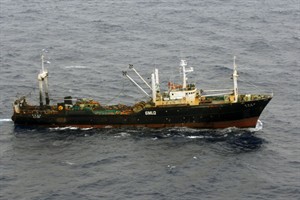Last Minute Brexit Trade Deal Hinges on Fishing Rights
By Marine Strauss and William James BRUSSELS/LONDON, Dec 18 (Reuters) – The European Union said on Friday there were just hours left to strike a Brexit trade deal while Britain called on...

 On August 18, 2010, the South Korean fishing vessel, Oyang 70, capsized and sank while working in the New Zealand´s exclusive economic zone (EEZ), resulting in the loss of six lives. Information provided by the survivors revealed a number of labor and human rights violations aboard the vessel, and suggested this type of abuse was not just limited to the Oyang 70.
On August 18, 2010, the South Korean fishing vessel, Oyang 70, capsized and sank while working in the New Zealand´s exclusive economic zone (EEZ), resulting in the loss of six lives. Information provided by the survivors revealed a number of labor and human rights violations aboard the vessel, and suggested this type of abuse was not just limited to the Oyang 70.
Now, an investigation by the University of Auckland has revealed Indonesian fisherman working on Korean-owned vessels in New Zealand waters have found themselves subject to unbelievably savage work conditions and treatment at the hands of their Korean officers.
“Officers are vicious bastards … factory manager just rapped this 12kg stainless steel pan over his head, splits the top of his head, blood pissing out everywhere…,” one informant told the University of Auckland.
Written by Management and International Business staff Dr Christina Stringer and Glenn Simmons, the report documents substandard conditions, verbal and physical abuse, sexual harassment, intimidation and threats, and absence of responsibility suffered by crew onboard particularly Korean fishing vessels.
Their research alleges:
“In the old days, slaves were not paid and chained, now we are paid and trapped, but we are worse than slaves,” one of the 143 crew or observers interviewed in New Zealand and Indonesia told the researchers.
The study found that crew working on New Zealand-flagged vessels earned up to 10 times more than their foreign counterparts, whose salary is paid to manning agents and who work on average 112 hours per week with shifts up to 53 hours in length and with no time off for two years.
This issue is not isolated to New Zealand’s waters…
A 2009 United Nations Inter-Agency Project on Human Trafficking report revealed:
“An estimated thousands of Cambodian men, women, and children are trafficked annually to Thailand for the purpose of labor exploitation. Some of the worst exploited are the men and boys who are deceived onto long-haul fishing boats that fish the waters of the South China Sea, including into Malaysian waters. These boats, out to sea for up to two years or more, become virtual prisons on which the trafficking victims endure inhumane working conditions, and physical abuse.
Death at sea is frequently reported, sometimes at the hands of the Thai boat captains. The only way to escape is to jump ship when the boat goes ashore for registration/documentation purposes in places like Sarawak, Malaysia.”
Their report “summarizes the facts about the trafficking of 49 Cambodian men and boys trafficked onto Thai long-haul fishing boats and assisted over the past 18 months by a network of responders spanning Cambodia, Thailand, and Malaysia.
There are some variations in the scenarios faced by these men and boys, but the common theme is deception and debt bondage by two or more Khmer and Thai brokers; their sale to a Thai boat owner for 10,000-15,000 Baht; slave-like working conditions at sea, including beatings, deprivation of food, inhumane work hours (for example, working 3 days and nights straight when nets need to be mended), lack of medical treatment for illnesses and injuries, and threats of death; and sometimes, reportedly, murder.”
“We were beat frequently by the Thai crew, on the back of the head and across the back. The captain had a gun. On shore [on Sarawak] we saw a Thai captain decapitate a Vietnamese fishmerman, and another Thai captain decapitate a Thai fisherman.”
– 19-year-old victim from Banteay Meanchey

Sign up for gCaptain’s newsletter and never miss an update

Subscribe to gCaptain Daily and stay informed with the latest global maritime and offshore news
Essential news coupled with the finest maritime content sourced from across the globe.
Sign Up